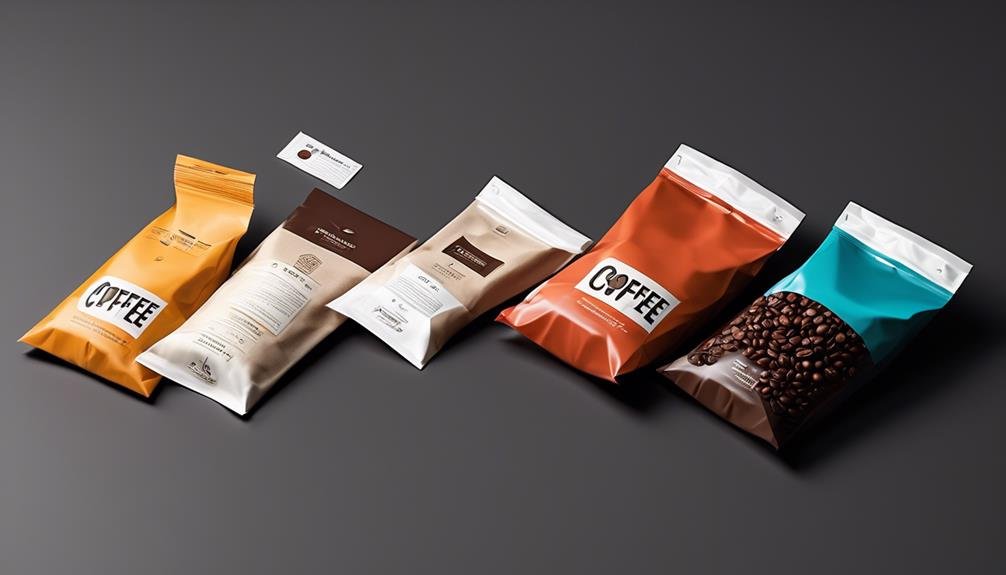So, you've just spent a fortune on that premium bag of coffee beans, expecting a rich and aromatic experience with every sip.
But alas, as time goes by, you notice that the flavor starts to fade away, leaving you with a lackluster cup of brew.
What could possibly be causing this tragic decline in freshness?
Well, dear coffee connoisseur, sit tight and prepare to have your taste buds tantalized as we explore the factors that contribute to the rapid deterioration of that beloved bean.
Key Takeaways
- Exposure to air, moisture, and light are key factors that contribute to coffee losing freshness faster.
- Proper storage in airtight containers, away from direct sunlight and moisture sources, is recommended to prevent oxidation, mold growth, and degradation of oils and compounds.
- Grinding coffee ahead of time leads to a stale and dull-tasting brew, as it increases the surface area exposed to oxygen and results in the loss of volatile compounds responsible for flavors and aromas.
- Oxygen exposure breaks down desirable flavors and forms stale and off-flavors, while moisture promotes mold growth and spoilage, and light accelerates degradation by promoting oxidation. Proper storage in a cool, dry place, away from moisture and light, is crucial for preserving flavor and safety.
Exposure to Air
Exposing coffee to air accelerates the deterioration of its freshness. When coffee beans are roasted, they undergo a series of chemical reactions that result in the formation of volatile compounds responsible for the beverage's aroma and flavor. However, these compounds are also highly susceptible to oxidation, which occurs when they come into contact with oxygen in the air. This oxidation process leads to the loss of those desirable aromatic compounds, resulting in a stale and flat-tasting cup of coffee.
The main culprits behind this freshness loss are oxygen and moisture. Oxygen acts as a catalyst for oxidation, causing the breakdown of the coffee's volatile compounds over time. Moisture, on the other hand, can facilitate the growth of mold and bacteria, further compromising the quality of the coffee.
To prevent exposure to air, it's crucial to store coffee properly. The use of airtight containers is highly recommended to create a barrier between the coffee and the surrounding environment. Additionally, it's advisable to store coffee in a cool, dry place, away from direct sunlight and moisture sources.
Moisture
To maintain the freshness of coffee, it's essential to minimize its exposure to moisture. Moisture can significantly impact the quality of coffee by accelerating its deterioration process. Here's why:
- Moisture causes oxidation: When coffee beans come into contact with moisture, it triggers oxidation, leading to the loss of desirable flavors and aromas. This process is accelerated in the presence of moisture, causing coffee to become stale quickly.
- Moisture promotes mold and mildew growth: Coffee is vulnerable to mold and mildew, especially when exposed to moisture. These microorganisms can produce toxins that affect the taste and safety of the coffee. Therefore, keeping coffee dry is crucial to prevent these unwanted contaminants.
- Moisture leads to clumping: Coffee grounds tend to clump together when exposed to moisture, resulting in uneven extraction and a subpar brewing experience. By keeping coffee dry, you can ensure a consistent grind size and extraction, ultimately improving the quality of your brew.
To minimize the exposure of coffee to moisture and maintain its freshness, it's recommended to store coffee beans or grounds in airtight containers in a cool and dry place. Avoid storing coffee in the refrigerator as it can introduce condensation. Additionally, it's essential to grind coffee just before brewing to minimize moisture absorption. By following these practices, you can enjoy a more flavorful and satisfying cup of coffee.
Improper Storage
Improper storage can greatly impact the freshness and quality of coffee. When coffee isn't stored correctly, it can quickly lose its flavor and aroma. One of the main factors that contribute to improper storage is exposure to air. Oxygen is the enemy of coffee, as it reacts with the oils and compounds in the beans, causing them to deteriorate and develop stale flavors.
To prevent this, it's important to store coffee in airtight containers, such as sealed bags or canisters.
Additionally, exposure to light can also negatively affect the quality of coffee. Ultraviolet (UV) rays from sunlight can degrade the coffee beans and lead to a loss of flavor and freshness. Therefore, it's best to store coffee in a dark and cool place, away from direct sunlight or strong artificial light sources.
Temperature fluctuations can also be detrimental to the freshness of coffee. Extreme temperatures can cause the oils in the beans to evaporate, resulting in a loss of flavor and aroma. It's recommended to store coffee in a cool and stable environment, away from heat sources or temperature changes.
Ground Coffee
Ground coffee plays a crucial role in the brewing process, as it allows for better extraction of flavors and aromas compared to whole beans. When it comes to freshness, however, ground coffee is more susceptible to rapid deterioration.
Here are three key factors that contribute to the faster loss of freshness in ground coffee:
- Increased surface area: Grinding coffee beans increases their surface area, exposing more of the coffee to air. Oxygen in the air interacts with the coffee compounds, leading to oxidation and the breakdown of flavors and aromas.
- Accelerated degassing: After coffee is roasted, it continues to release carbon dioxide gas for some time. Grinding the coffee accelerates this degassing process, causing the CO2 to escape more rapidly. As a result, the flavors and aromas that are carried by the gas can dissipate more quickly.
- Enhanced moisture absorption: Ground coffee has a larger surface area, making it more prone to absorbing moisture from the environment. Moisture can negatively affect the flavor, aroma, and freshness of the coffee, leading to a dull and stale taste.
To minimize the loss of freshness in ground coffee, it's recommended to store it in airtight containers, away from light, heat, and moisture. Additionally, grinding coffee just before brewing can help retain more of the coffee's flavors and aromas.
Light
As ground coffee is vulnerable to factors that compromise its freshness, one important aspect to consider is the role of light in this process. When coffee beans are roasted and ground, they undergo chemical changes that result in the release of volatile compounds responsible for the beverage's aroma and flavor. However, these compounds are highly sensitive to light, which can cause them to degrade and lead to a loss of freshness.
Light, especially ultraviolet (UV) light, can initiate chemical reactions in coffee compounds, resulting in the formation of off-flavors and a decrease in quality. This is why coffee manufacturers often use opaque packaging to protect their products from light exposure. Additionally, storing coffee in clear or glass containers can also allow light to penetrate and accelerate the degradation process.
It is important to note that not all light wavelengths have the same impact on coffee freshness. UV light, for instance, has a stronger effect compared to visible light. Therefore, it's advisable to store coffee in a dark, cool place to minimize light exposure and preserve its freshness for longer.
Temperature Fluctuations
Temperature fluctuations play a significant role in the freshness loss of coffee. Understanding how temperature affects the quality of coffee is crucial for preserving its freshness and flavor. Here are three key points to consider:
- Accelerated oxidation: Temperature fluctuations can accelerate the oxidation process in coffee. When exposed to higher temperatures, the oils in the coffee beans break down more quickly, leading to a loss of flavor and aroma. Conversely, when exposed to lower temperatures, the coffee beans may absorb moisture from the air, resulting in a stale taste.
- Inconsistent extraction: Fluctuating temperatures can also affect the extraction process. When brewing coffee, temperature control is essential to ensure optimal extraction of flavors. If the temperature is too high, the coffee can become over-extracted and taste bitter. On the other hand, if the temperature is too low, the coffee may be under-extracted, resulting in a weak and flat flavor profile.
- Condensation and moisture damage: Rapid temperature changes can cause condensation to form inside the coffee packaging. This moisture can lead to mold growth and spoilage, compromising the quality and safety of the coffee.
To mitigate the negative effects of temperature fluctuations, it's crucial to store coffee in a cool, dry place away from direct sunlight and heat sources. Additionally, using airtight containers can help preserve the freshness of coffee for a longer period.
Aging
To maintain the freshness and flavor of coffee, it is important to understand the impact of aging on its quality. As coffee ages, it undergoes chemical changes that can result in a loss of aroma, taste, and overall quality. One major factor contributing to the aging process is the exposure to oxygen. Oxygen reacts with the compounds in coffee, causing a breakdown of desirable flavors and the formation of stale and off-flavors. Another factor is moisture, which can lead to the growth of mold and spoilage. Additionally, light can accelerate the degradation of coffee by promoting oxidation and the breakdown of volatile compounds.
To better understand the effects of aging on coffee, let's take a look at the table below:
| Aging Factor | Impact on Coffee |
|---|---|
| Oxygen | Breakdown of flavors, formation of stale and off-flavors |
| Moisture | Growth of mold, spoilage |
| Light | Accelerated degradation, oxidation, breakdown of volatile compounds |
Grinding Ahead of Time
Grinding coffee beans ahead of time can adversely affect the freshness and flavor of the resulting brew. When you grind coffee ahead of time, the exposure to oxygen accelerates the oxidation process, causing the coffee to lose its freshness more rapidly. This can lead to a stale and dull-tasting cup of coffee.
Here are three reasons why grinding ahead of time can be detrimental to the quality of your brew:
- Increased surface area: Grinding coffee beans exposes a larger surface area to oxygen. This increased contact with the air promotes the oxidation process, which degrades the flavor compounds and aromatics in the coffee.
- Loss of volatile compounds: Coffee beans contain volatile compounds that contribute to its unique flavors and aromas. Grinding ahead of time releases these compounds into the air, resulting in a loss of the desirable flavors and aromas in your brew.
- Uneven extraction: Freshly ground coffee ensures a consistent particle size, which allows for even extraction during brewing. When coffee is ground ahead of time, the particles may become uneven, leading to an inconsistent extraction and a subpar cup of coffee.
To preserve the freshness and flavor of your coffee, it's best to grind your beans just before brewing. By doing so, you can maximize the potential of your coffee beans and enjoy a truly flavorful and aromatic cup of joe.
Frequently Asked Questions
Can Coffee Lose Freshness Even if It Is Stored in an Airtight Container?
Yes, coffee can lose freshness even when stored in an airtight container. Factors like exposure to light, oxygen, and moisture can still affect its flavor and aroma over time.
How Does Exposure to Light Affect the Freshness of Coffee?
Exposure to light accelerates the loss of freshness in coffee. Light causes the degradation of organic compounds, such as oils and flavors, leading to a decrease in taste and aroma. Store your coffee in a dark, airtight container to preserve its freshness longer.
What Are the Signs of Coffee That Has Lost Its Freshness?
Coffee loses freshness faster when exposed to air, moisture, and heat. Signs of coffee that has lost freshness include a dull aroma, flat taste, and lack of crema. Proper storage in airtight containers can help maintain freshness.
Can Storing Coffee in the Refrigerator Help to Preserve Its Freshness?
Storing coffee in the refrigerator can actually cause it to lose freshness faster. The fluctuating temperatures and exposure to moisture can degrade the flavor and aroma. It's best to keep coffee in an airtight container at room temperature.
Is It Better to Buy Whole Bean Coffee or Pre-Ground Coffee for Freshness?
It's better to buy whole bean coffee for freshness. When coffee is pre-ground, it exposes more surface area to air, causing it to lose freshness faster. Whole bean coffee retains its freshness longer.
Conclusion
In conclusion, several factors contribute to the rapid loss of freshness in coffee. Exposure to air, moisture, and improper storage conditions can all accelerate the deterioration process. Ground coffee, when exposed to these elements, is particularly susceptible.
Additionally, light, temperature fluctuations, and aging further impact the coffee's quality.
To maintain optimal freshness, it's essential to store coffee properly, avoid grinding ahead of time, and consume it within a reasonable timeframe.




